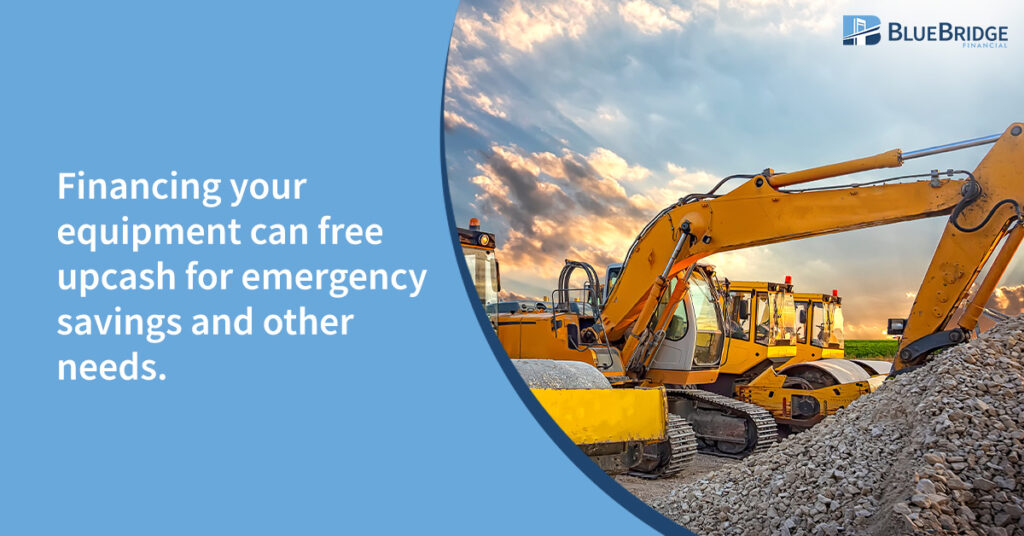9 Tips For Starting a Construction Company
Lay a Solid Foundation: Essential Tips for Launching Your Construction Business
Starting your own construction company is an exciting and challenging endeavor. In 2022, the construction industry was valued at over $2.8 trillion. It’s the 12th largest industry in the U.S. As you can see, the construction industry offers many opportunities but also requires preparation. In this article, we’ll walk you through 9 tips for how to start a construction company. Once you get your company off the ground, we’re here to help with all your construction equipment financing and leasing needs.
Determine Your Area of Expertise
Choosing a niche can help your new construction business stand out. First, review your top competitors. Are they concentrated in one or two specialties? Is there a gap in the market that your new business could fill? For example, if there are already a lot of home construction businesses, you could target the commercial niche with real estate development and office building renovation. Even if you’re entering a crowded market, you could distinguish your company by offering specialized services, touting your identity (veteran-owned, for example), or standing out with branding or pricing.
Once you’ve chosen your area of expertise, you need employees whose skillset aligns with the kind of jobs you’ll be working on. If there are gaps, you can either hire new team members or provide training to your existing team.
The final step is to run a profitability analysis. Some construction niches may be more profitable than others, but in general, 8-15% is considered a good profit margin in construction.

Choose a legal structure for your company
This may not be the most fun part of starting a construction company, but it’s arguably the most important part. Getting your legal house in order will allow your company to operate, pay taxes, etc. without issue. First, you need to choose a business structure. Each has unique effects on operation, taxation, and responsibility.
- Corporation: The company is a separate entity from its owners. This is the most complex business structure.
- LLC: A hybrid of the partnership and corporation structures. Protects your personal assets from liability.
- Partnership: Two or more people own and operate the business. Choose between general and limited partnerships.
- Sole Proprietorship: One person owns and operates the business. The sole proprietor is also solely liable for the company’s financial obligations.
Licenses and Permits
Obtain any required business licenses at the state and local level. Before starting a job, make sure you’ve secured the necessary permits.
Insurance and contracts
Consider your business insurance needs; for example, workers’ comp, general liability, unemployment, etc.
Drawing up a contract before each job protects your company and helps to set expectations with customers. Create concise, thorough contracts to safeguard your clientele and your company.
Decide Who You’ll Employ
As of January 2023, the construction sector employed over 7.8 million individuals, or 2.9% of all American workers. When it comes to finding employees for your new construction business, you want to hire people whose talents match the requirements of your company. Think about masons, electricians, carpenters, etc. Next, you need to decide if you only want seasoned professionals or are you open to training new hires? Finally, how many full-time employees do you want to bring on vs. contractors?
Establish a Marketing Budget
To get the word out about your company and services, you’ll need to create and invest in a marketing strategy. It may be helpful to talk to other construction business owners in your area. What do they recommend spending money on vs. doing yourself? Which strategies seem most effective? The best marketing strategies tend to be a mix of digital (social media, YouTube, ads, and content) and traditional (flyers, yard signs, ads in the local paper, word-of-mouth) tactics.
To determine future marketing choices, track the results of your efforts as best you can. The decisions that bring the best Return on Investment (ROI) are what you’ll want to repeat and invest more in.

Invest in Quality Equipment
As the owner of a construction company, quality equipment that’s in good working order is key to your success. Construction equipment can be expensive, so you have to decide when to rent, buy in cash, or finance the purchase of your equipment. Consider the following:
Long-Term Savings
High-quality equipment provides more stability and reduced maintenance costs, leading to financial savings in the long run. Financing your equipment can free up cash for emergency savings and other needs, while offering affordable monthly installment payments.
Safety and Reputation
Investing in top-tier equipment ensures employee safety and enhances the company’s reputation for expertise and dependability. If you purchase your equipment, you will be responsible for the cost of repairs and maintenance. If you decide to rent, review the rental agreement to make sure the company will take care of repairs and maintenance for you.
Enhanced Efficiency
Better equipment often integrates advanced features that improve efficiency, enabling faster and more precise project completion.
Choose a Construction Management Software System
Using technology and construction management software can increase the efficiency of your operation. Here are some tips to help you choose the right software system.
- Verify that the program satisfies your requirements, including for client communication and project management.
- To cut down on training time, look for solutions that are easy to learn and use.
- Look for software that is scalable and can expand with your company without requiring system changes.
- Your other tools, such as your financial or HR systems, should be able to integrate effortlessly with the construction software.
Sign Up for Lead Generation Services
According to the 2023 State of Residential Construction Industry Report, the greatest challenge for builders is generating quality leads; 40.4% of those polled said it was their biggest sales problem. The benefits of signing up for lead generation services include:
- Comprehensive reach: Through these services, you could reach clients that you may not have otherwise encountered.
- Cost-effective: Lead generation focuses on the audience you want to reach rather than spreading your resources thin.
- Increased conversion: Qualified leads offer a better chance of turning inquiries into projects.
- Market insights: Use data analytics to better understand consumer patterns and preferences.
Focus on Quality Customer Service
When you have a client-facing business such as construction, excellent customer service is a must. Here’s how to commit to quality customer service:
- Open Communication: Inform clients on a regular basis of project developments, difficulties, and modifications.
- After-Sales Service: One-time clients can become recurring clients with post-completion assistance.
- Feedback Loop: Ask for feedback and act on it to make your services better moving forward.
- Transparent Pricing: No additional expenses or hidden fees. Be straightforward and truthful when quoting someone.

Network With Colleagues and Prospective Clients
Make yourself known around the community. Networking with other construction business owners, architects, real estate agents, etc. can help you get referrals. And meeting people in the community through volunteering, sponsoring local sports teams, etc. will make you top of mind when someone is looking for a contractor. Here are the best ways to network:
- Industry Associations: Join organizations like the National Association of Home Builders (NAHB) or the Associated Builders and Contractors (ABC) to get opportunities and reputation.
- Local Community: To increase your presence locally, go to neighborhood gatherings or chamber of business meetings.
- Online Presence: Participate in LinkedIn groups, construction forums, and other platforms tailored to the sector.
- Continuous Learning: To keep current and network with colleagues, go to conferences, workshops, and seminars.
About Blue Bridge Financial
We are your construction industry expert with over $57 million in Heavy Construction and Specialty Trade loans. Start-up financing is also available. Our flexible loan programs and competitive rates are tailored to the needs of your construction business. There are no age or mileage restrictions and we work with private party sellers. Get your funds fast with same-day loan approvals. Strapped for cash but need equipment now? You can defer your loan payments for 90 days with our deferred payments program.
Starting a construction company requires not just industry knowledge but also creativity, planning, and dedication to quality. At Blue Bridge Financial, we know that one size doesn’t fit all. We can customize an equipment loan to meet the financing needs of your small to medium-sized construction business. Contact us today!
Any Questions? We'd Love to Talk:
About the Author
Nick Devernis is the Vice President of Business Development with expertise in credit analysis and equipment financing. With over 6 years in equipment financing, he offers a wealth of knowledge to readers of Blue Bridge Financial’s blog. He currently oversees the California office and leads the Sales and Marketing departments. Nick’s role as Vice President of Business Development involves management of the sales team, relationship management, and developing strategic partnerships to drive inbound and outbound originations.p> LinkedIn Profile





